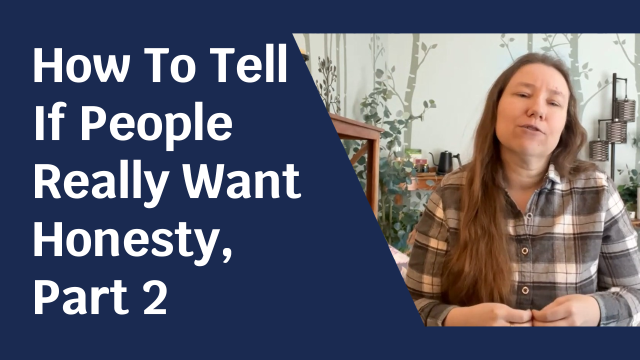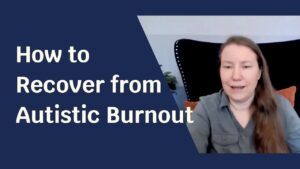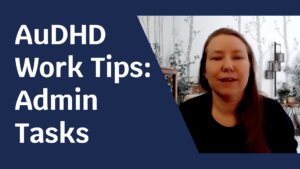
Asking for honesty
In part one of this, I talked about how to tell whether people who say that they want you to be honest with them, actually want the truth, or whether they’re more likely to get mad or defensive.
I want to add onto that with a related thought, and that is to explore a little of what I think people really mean when they say they want you to be honest with them, and then it turns out that they didn’t.
Because as contradictory as this might seem, when people say that they want you to be honest with them, often they are being honest, yet it might not be in the way they think they mean by it. Stick with me. This is gonna get nuanced.
When people say that they want you to be honest with them, often they are being honest, yet it might not be in the way they think they mean by it.
My very literal Autistic brain spent most of my life, until quite recently, thinking that when people said they want honesty, that they meant that they wanted me to tell them the truth. And, duh, that makes sense.
And there are times when that’s the case. There are people who genuinely do want the truth and are at a point in their life when they can handle that.
But there are also lots of times when people say that they want you to be honest with them, but then they get mad or defensive, or they say it’s fine but things get weird between you two later. I’ve been flabbergasted when that’s happened, because they said they wanted the truth. So I told them the truth. But they just got mad at me. And yeah, that hurt, and it was confusing and resulted in a lot of anxieties.
I talked about how to tell which people are likely to have which reactions in part one.
Right now what I want to get into is what’s really going on in those situations when people say that they want the truth, but then react badly to it. Because I think they genuinely think that they want it, they’re not just trying to be polite or look good, though those motives can be factors.
What they really want
Here’s the thing that clicked quite recently, and that’s really changed my perspective on this whole situation.
I think that for a lot of people, what they mean when they say that they want you to be honest with them, is that they don’t want you to lie to them. They don’t want to be deceived. They don’t want to be manipulated. Because we’ve all had experiences in life where we’ve been duped, and it feels terrible. And they don’t want that terrible feeling again.
But as a society, we often think of honesty and lying as an either-or thing. And so, because we don’t want lies, we don’t want to be deceived—that’s definitely the case—we think that we want honesty.
Yet we might not be in an emotional or mental or spiritual position to be able to handle the truth. But we ask for honesty because what we’re asking is: please don’t lie to me. Please don’t deceive me. Please don’t manipulate me. That’s what we think we’re asking for. But we get something very different.
We ask for honesty because what we’re asking is: please don’t lie to me. Please don’t deceive me. Please don’t manipulate me.
We get information we don’t like, or that’s confusing, or overwhelming. Or other people’s interpretations that might trigger old wounds, or painful thoughts about ourselves. Or emotions that we don’t know how to handle. Or someone else’s insight into something about ourselves that we don’t want to see. So that’s what we get. And sometimes these brings up the same terrible feelings we were trying to avoid by avoiding being lied to.
So all our defenses come up. All our strategies for fending off the bad stuff, the overwhelming stuff, the fears, the anxieties, the confusion, the hurt, and then we get mad because we thought we were avoiding the terrible feelings when we asked, “please don’t lie to me.”
Giving honesty
So now let’s switch to the other person’s point of view, the truth tellers point of view. When we’re this person, we thought we were giving someone exactly what they wanted. But then we’re getting this venom back, this animosity, or weirdness in the relationship, or however it’s being expressed. And that doesn’t make sense because they asked for honesty, they asked for the truth, and we give them exactly what they wanted, or at least what we thought they wanted, what we thought they said they wanted, and now they’re hurting us for trying to help.
Am I explaining this well?
So I think this is the dynamic that happens over and over to a lot of us: we’re asking for and answering different questions.
So that’s why I was talking in the last video about how, when I don’t have a track record with with someone to have a reasonable idea of how they’re likely to respond in the moment, when they ask for honesty, I give them a small bit of it. It’s a litmus test. It’s finding out what it is that they’re actually asking for right now. Are they asking for the truth or are they simply asking not to be lied to?
And depending on how they respond to that little bit of truth, I can better gauge how to proceed. I can better answer the question that is being asked, not the one that matches the words that are being said. It’s not perfect, as people put up strong, social façades, so I still can’t always tell, but that’s not my fault. That’s their impenetrable walls making something unknowable.
So I still can’t always tell, but that’s not my fault. That’s their impenetrable walls making something unknowable.
But I’ve made a personal decision that I’m always going to be honest with people because I am so over playing games of trying to guess what someone is thinking. But this is a different kind of thing. It’s not just trying to guess what the answer is that they’re looking for. It’s gauging their ability to tolerate the only way that I’m willing to be in the world anymore, and that is authentically.
I’m wondering how this idea matches your own experience. I’d love to get your reflections in the comments below. And yes, I really do mean that. I love to read them. Even though I don’t always reply to everyone, simply because of time constraints.
All right. If there’s someone that you think this might clear things up for, would you like to share this with them? And if you’re interested in part one, I’ll put a link to that here so you can find it easily.
Take care, and have a neurowonderful day.




